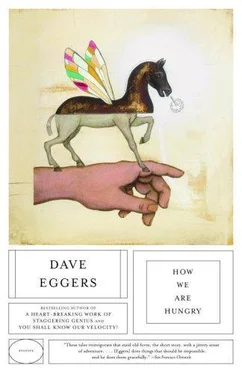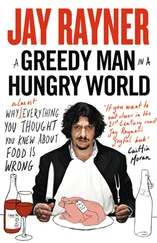Dave Eggers - How We Are Hungry
Здесь есть возможность читать онлайн «Dave Eggers - How We Are Hungry» весь текст электронной книги совершенно бесплатно (целиком полную версию без сокращений). В некоторых случаях можно слушать аудио, скачать через торрент в формате fb2 и присутствует краткое содержание. Год выпуска: 2005, Издательство: Vintage Canada, Жанр: Современная проза, на английском языке. Описание произведения, (предисловие) а так же отзывы посетителей доступны на портале библиотеки ЛибКат.
- Название:How We Are Hungry
- Автор:
- Издательство:Vintage Canada
- Жанр:
- Год:2005
- ISBN:нет данных
- Рейтинг книги:3 / 5. Голосов: 1
-
Избранное:Добавить в избранное
- Отзывы:
-
Ваша оценка:
- 60
- 1
- 2
- 3
- 4
- 5
How We Are Hungry: краткое содержание, описание и аннотация
Предлагаем к чтению аннотацию, описание, краткое содержание или предисловие (зависит от того, что написал сам автор книги «How We Are Hungry»). Если вы не нашли необходимую информацию о книге — напишите в комментариях, мы постараемся отыскать её.
A Heartbreaking Work of Staggering Genius
How We Are Hungry — читать онлайн бесплатно полную книгу (весь текст) целиком
Ниже представлен текст книги, разбитый по страницам. Система сохранения места последней прочитанной страницы, позволяет с удобством читать онлайн бесплатно книгу «How We Are Hungry», без необходимости каждый раз заново искать на чём Вы остановились. Поставьте закладку, и сможете в любой момент перейти на страницу, на которой закончили чтение.
Интервал:
Закладка:
THE ONLY MEANING OF THE OIL-WET WATER
PILAR WAS NOT getting over divorce or infidelity or death. She was fleeing nothing. She flew to Costa Rica one day, on two planes, from Champaign, then Miami, because she had time off and Hand, her longtime friend, was there, or near enough. There is almost no sadness in this story.
Pilar: she is not Latin in any way she knows, but ever since she was very young she’s heard from friends and strangers that her name is a Latin or Latin-sounding one. She is always embarrassed to admit, though she’s admitted it a hundred times, that she’s never looked up the provenance of her name, its meaning, or anything else about it. Her skin is the color of blond wood, easily tanning, and her hair is black, which reinforces the assumption of her Latinness, even though she’s been told by her parents, always, that she’s Irish and only Irish — maybe some Scottish, perhaps a jab of German. Though with her hair in a ponytail and with her long legs, very long for a woman not even five and a half feet tall, she resembles, more than anything, popular images of Pocahontas. She always wanted to have some Native American blood in her, just as everyone does, because with that blood, she thought, stupidly, would come nobility, as would excuses to do things the wrong way, or not do them at all, to do anything she wanted. But instead she is Irish or possibly even Welsh but not in any tangible sense, and thus born without any sorrow in the lives of her recent ancestors, and so she had to smile gratefully and create good things from scratch or perhaps just save people from skin disease. Pilar was a doctor, a young one, a dermatologist. Her profession does not figure into this story.
PILAR WALKED: with her toes pointing northwest and northeast, like a dancer.
PILAR LAUGHED: in a throaty way, and loudly, while her eyes devoured.
PILAR KNEW: when something would happen, and when something would not.
Hand was in Granada, Nicaragua, for six months and was encouraging all visitors. He was working for Intel, doing something Pilar could never really grasp, even if she wanted to, which she didn’t, because her brain, she believed, was meant to be filled with more colorful things. Intel had asserted itself in Central America and was rotating in young Spanish-speaking consultants like Hand for a year or two at a time. Pilar couldn’t imagine what Hand would know that Nicaraguan Intel could need, but then again, this was the sort of arrangement he always landed — well-paying, low-commitment, impossible to explain. Pilar accepted Hand’s invitation, but they couldn’t agree on what the week would entail. Hand, sick of Nicaragua for the time being, wanted a week in Costa Rica, surfing and looking at women jogging across the flat wet sand. Pilar wanted to see Nicaragua, because everyone, it seemed, had seen Costa Rica, but no one she knew had set foot in Nicaragua. Nicaragua sounded dangerous; she liked the word. Nicaragua! It sounded like some kind of spider. There it goes, under the table — Nicaragua!
Hand got his way. They’d be surfing in Costa Rica, on the Pacific coast. But Pilar didn’t mind. She would tell everyone she went to Nicaragua anyway.
In San Jose the humidity covered her with many gloved hands. She rented a car and immediately went the wrong direction, headed straight into the city’s center when she wanted to do the opposite. It was easily ninety degrees and she was in the merchants’ district, filled with cheap electronics and men selling things from white aluminum carts. Rental car agencies and banks and students. Clumps of pedestrians jogging through traffic. Office buildings of the sixties steel-and-glass Erector-set sort, flimsy and forgettable. The road was five lanes wide and was jammed but moving. San Jose looked like L.A. circa 1973, and she puttered through the city weirdly horny. The heat maybe. The volume of the sidewalks maybe. She watched women through her windshield and they watched her. She found an English-language station and on it Michael Jackson’s “Rock with You” and she thought she would burst. She was happy, and she’d been for a few years able to recognize it, just dumb happiness, when it came, whatever its cause. When people asked how she was, she said Happy, and this made some people angry. There was traffic heading into town and she was moving, legs and arms and neck, with Michael, who she knew she’d like if she met him. She would understand him and they’d laugh and laugh about nothing, standing in his kitchen.
HAND HAD: loved three of Pilar’s oldest friends, and she knew everything.
HAND WOULD: leave this world and everyone in it if given the chance to be in space for just a few minutes.
HAND CRIED: when he read about men falsely imprisoned, freed at age forty, and walking the streets without malice.
She found her way out of the city and drove straight west, through the tolls by the airport and then around the two-lane bends, hundreds of turns through the hill country, waiting behind so many trucks, everyone so slow. The countryside was neat and green and lush and everything was for sale. At the airport they had been selling real estate; at the car rental place, at every gas station, slick posters and handmade flyers of properties for the taking, beachfront or lowland — everywhere along the road, plots and properties available. The Costa Ricans were proud of what they’d created — the most sturdy, the most predictable, easily the most tourist-amenable nation in Central America — and now that it was ripe, they were bringing it all to market. The highway was tumored with SUVs and buses. Pilar had expected jalopies and wood-fenced fruit trucks, but they were rare. This country was singing with space and sky and bright smooth new cars with clean black tires. There was heat, but between the sun and the treetops were quick-moving clouds, and they dragged black shadows over the leaves.
LOW-FLYING, QUICK-MOVING CLOUDS: I haven’t long to live.
TREETOPS, ROUNDED AND ROUGH: That’s probably true.
LOW-FLYING, QUICK-MOVING CLOUDS: I won’t even make it to the sea. I can already see where I’ll end.
TREETOPS, ROUNDED AND ROUGH: I don’t know what to tell you.
LOW-FLYING, QUICK-MOVING CLOUDS: But the thing is, I really love moving like this, though I know I won’t even make it.
TREETOPS, ROUNDED AND ROUGH: There are advantages to flight.
LOW-FLYING, QUICK-MOVING CLOUDS: But thought is its unfitting companion.
Pilar was meeting Hand at Playa Alta, because there, Hand said, the waves were forgiving and not too big, the water warm, and the beach almost empty. Even when it’s crowded it looks empty, this beach, he said. A big flat playa, he said, and she cringed, because Hand, she knew, would say playa when he meant beach, if that beach was located in a Spanish-speaking country. She loved him. He was ludicrous.
There is no way or reason to be subtle about why Pilar was in Costa Rica. At thirty-one she was still unmarried and Hand was one of her few old friends also still unmarried, and the only attractive old friend she’d never slept with. So she knew, when she hung up the phone with Hand five weeks prior, that she would sleep with him in Alta, and she knew it on the plane and on the drive to the coast.
Was she in any way saddened by the predictability of the outcome? Was it unromantic? She decided that it was not. Sex and things like sex — things people pretend they regret— weren’t about a decision made in a heated moment. The decision is made when you leave the house, when you get on a plane, when you dial a number.
She would arrive and hope that he still looked the way she liked him to look — lean, bigmouthed, clean. They would spend the first day pretending to be friends only, barely touching arms. The second night they would drink at dinner, and drink after that, amid shirtless and dreadlocked surfers, and then would sleep together in a tentative and civilized way. That much was assured, because Pilar had done this kind of thing before — with Mark in Toronto, with Angela in San Diego — and there was never variation in the setup; only the aftermath was alterable. Afterward, with Hand, there could be very little change in their affection and respect for each other: she was too careful, and he too loosely strung. Afterward, with Mark, she’d had to tolerate his frequent references to their weekend, both the almost-funny—“I saw you naked!”—and those helping him achieve a personal sort of release—“What were you wearing that weekend? Tell me again. Wait, hold on…”—but again, with Hand, she knew it would be mild, perhaps even forgotten, if it didn’t grow into something else. But would they want to continue having sex? That’s the simple and only question. And that depended on so many things: Would he do something strange with his tongue? Was his naked body odd in any disastrous way? Was he awkward-moving when nude? Would he cry (Mark) or become callous (Angela)? His legs might be too thin or pale, or his penis purple, or too narrow, his mouth too—
Читать дальшеИнтервал:
Закладка:
Похожие книги на «How We Are Hungry»
Представляем Вашему вниманию похожие книги на «How We Are Hungry» списком для выбора. Мы отобрали схожую по названию и смыслу литературу в надежде предоставить читателям больше вариантов отыскать новые, интересные, ещё непрочитанные произведения.
Обсуждение, отзывы о книге «How We Are Hungry» и просто собственные мнения читателей. Оставьте ваши комментарии, напишите, что Вы думаете о произведении, его смысле или главных героях. Укажите что конкретно понравилось, а что нет, и почему Вы так считаете.












